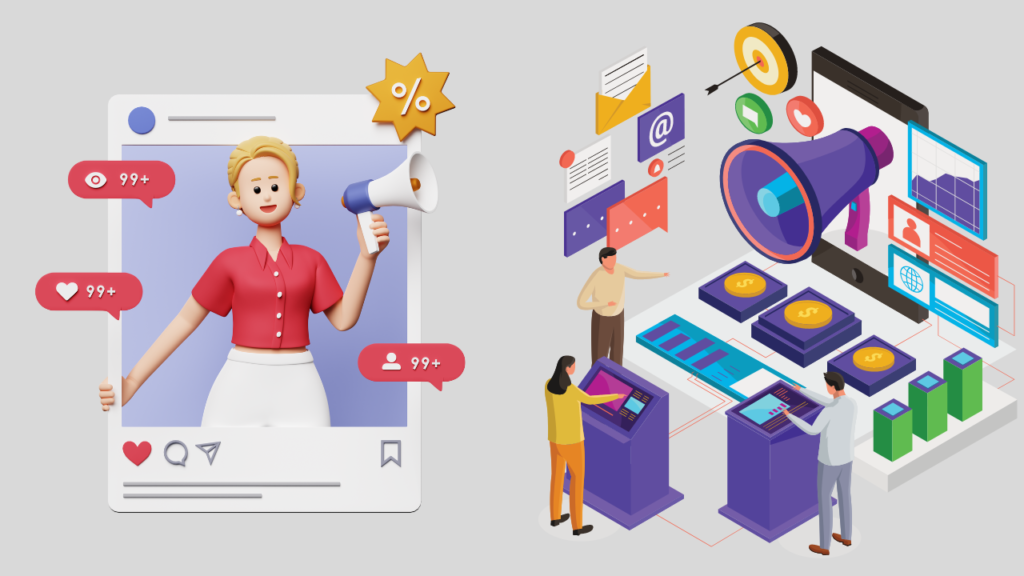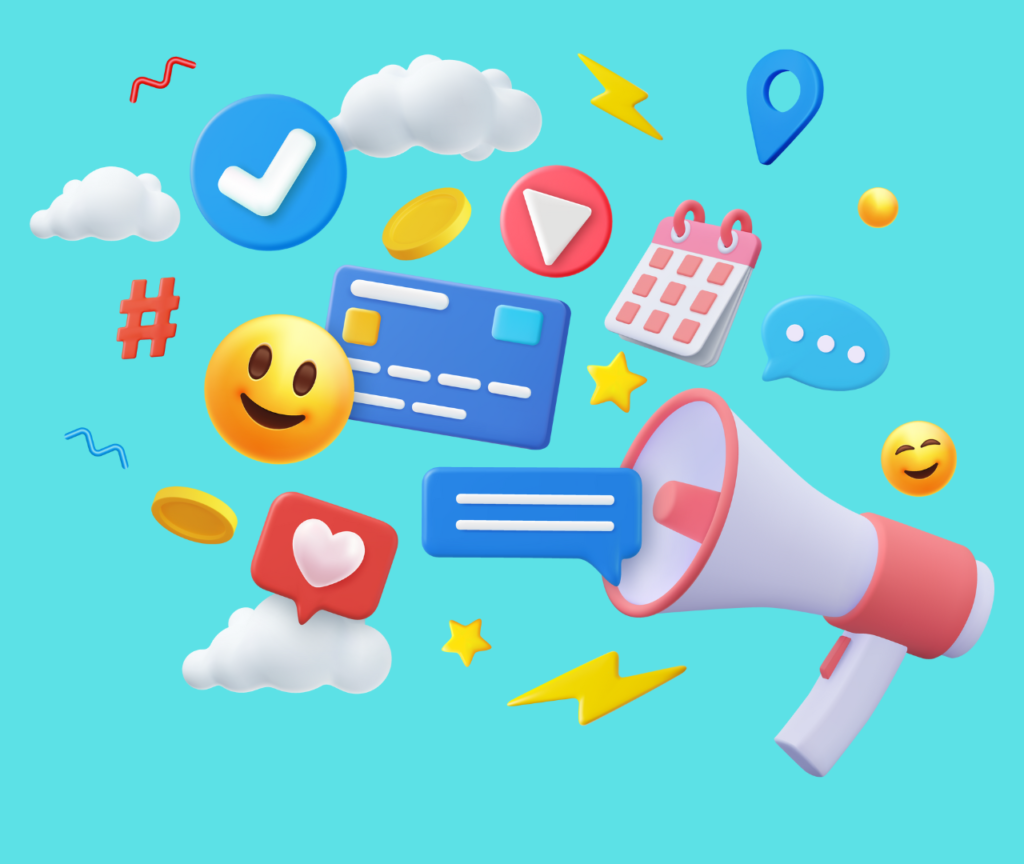Today Blog is for digital marketing || digital marketing course free Download how? digital marketing course free main kaise download kare.
It encompasses a wide range of online tactics and strategies aimed at reaching potential customers where they spend much of their time: on the internet.
Key components of digital marketing include:
- Search Engine Optimization (SEO): The process of optimizing your website to rank higher in search engine results pages (SERPs) for relevant keywords, thereby increasing organic (non-paid) traffic.
- Search Engine Marketing (SEM): Paid advertising on search engines like Google, where advertisers bid on keywords to display their ads prominently in search results.
- Social Media Marketing (SMM): Social media marketing involves leveraging social platforms to connect with the target audience, build brand awareness, drive website traffic, and foster engagement through content, ads, and interactions.
- Content Marketing: Creating and distributing valuable, relevant content (such as blog posts, videos, infographics, etc.) to attract and retain a target audience, with the goal of driving profitable customer action.
- Email Marketing: Sending targeted messages and promotional content via email to nurture leads, build customer relationships, and drive conversions.
- Affiliate Marketing: Partnering with other businesses or individuals (affiliates) who promote your products or services in exchange for a commission for each sale or referral generated through their efforts.
- Influencer marketing: Influencer marketing involves collaborating with individuals who have significant online followings to promote products or services to their audience, leveraging their credibility and influence for brand promotion.
- Pay-Per-Click Advertising (PPC): An advertising model where advertisers pay a fee each time their ad is clicked, commonly used in search engine advertising (e.g., Google Ads) and social media advertising (e.g., Facebook Ads).
- Display Advertising: Placing banner ads or other visual advertisements on websites, apps, or social media platforms to reach a targeted audience.
- Mobile Marketing: Mobile marketing is a strategy that involves reaching and engaging with audiences through mobile devices, including smartphones and tablets, using techniques such as SMS, mobile apps, and location-based targeting.
- Online: digital marketing course free how to download step by step ?
Digital marketing offers businesses various advantages, including precise targeting, measurable results, flexibility, and the ability to reach a global audience. It continues to evolve rapidly alongside advancements in technology and changes in consumer behavior. digital marketing course free Download how step by step.

What is SEO ?
The goal of SEO is to increase organic (non-paid) traffic to the website by making it more accessible to search engines and more appealing to users.
Key components of SEO include:
- Keyword Research: Identifying relevant keywords and phrases that potential customers are likely to use when searching for information related to your website’s content, products, or services.
- On-Page Optimization: Optimizing various elements on individual web pages to improve their relevance and visibility to search engines. This includes optimizing title tags, meta descriptions, headings, and content, as well as ensuring proper URL structure, internal linking, and the use of relevant keywords.
- Off-Page Optimization: Off-page SEO involves optimizing factors outside of a website to improve its search engine rankings and visibility. This includes activities such as link building, social media marketing, and online reputation management. Off-page SEO also involves activities such as social media marketing, influencer outreach, and online PR to increase brand visibility and attract more inbound links.
- Technical SEO: Ensuring that the website is technically sound and optimized for search engine crawlers to efficiently crawl and index its pages.
- Content Creation and Optimization: Producing high-quality, relevant, and engaging content that provides value to users and aligns with their search intent. This includes optimizing content for target keywords, addressing common questions and concerns, and regularly updating and refreshing content to keep it current and relevant.
- User Experience (UX) Optimization: Improving the overall user experience of the website to increase user satisfaction and engagement, which can indirectly impact SEO rankings. This includes optimizing site navigation, improving page load times, ensuring mobile-friendliness, and providing clear calls-to-action.
- Course: This is course about digital marketing course free how can download free?
- Local SEO (for local businesses): Optimizing the website for local search queries to improve visibility in local search results, particularly for businesses targeting customers in specific geographic locations. This involves optimizing Google My Business listings, obtaining local citations, and encouraging positive reviews from customers.
SEO is an ongoing process that requires continuous monitoring, analysis, and adjustment to keep up with changes in search engine algorithms, industry trends, and user behavior. While SEO results may take time to manifest, a well-executed SEO strategy can significantly increase organic traffic, improve online visibility, and drive long-term sustainable growth for businesses.
What is Facebook Ads ?
Facebook Ads is a paid advertising platform provided by Facebook, allowing businesses to create and target ads to reach specific audiences on the social media platform and its affiliated apps (such as Instagram). Advertisers can create various ad formats, including image ads, video ads, carousel ads, and more, to promote their products, services, events, or content. digital marketing course free Download how ?
Key components of Facebook Ads include:
- Ad Creation: Advertisers can create ads using Facebook’s Ads Manager or Business Manager. They can choose from various ad formats, including single image ads, video ads, carousel ads, slideshow ads, and collection ads.
- Targeting Options: Facebook offers extensive targeting options to help advertisers reach their desired audience. This includes demographic targeting (such as age, gender, location), interest-based targeting (based on users’ interests, behaviors, and interactions on Facebook), and custom audience targeting (using customer data like email lists or website visitors).
- Ad Placement: Advertisers can choose where their ads will be displayed across Facebook’s family of apps and services, including the Facebook News Feed, Instagram Feed, Instagram Stories, Audience Network, Messenger, and more.
- Budget and Bidding: Advertisers can set a budget for their ad campaigns and choose from different bidding strategies, such as cost per click (CPC), cost per thousand impressions (CPM), or cost per acquisition (CPA). digital marketing course free Download kaise kare ?

- Ad Optimization: Facebook Ads offers various optimization features to improve ad performance, including ad scheduling, ad rotation, and split testing (A/B testing) to compare different ad variations and determine which performs best.
- Measurement and Reporting: Facebook provides detailed insights and analytics on ad performance, including metrics like reach, impressions, clicks, conversions, and return on ad spend (ROAS). Advertisers can use this data to track the effectiveness of their campaigns and make informed decisions about future ad strategies.
- Remarketing: Advertisers can retarget users who have previously interacted with their website, app, or Facebook page by creating custom remarketing audiences. This allows businesses to re-engage with users who have shown interest but haven’t converted yet.
- Ad Policies and Compliance: Facebook has specific ad policies and guidelines that advertisers must follow to ensure their ads comply with community standards and legal requirements. Advertisements that violate these policies may be rejected or removed by Facebook.
Facebook Ads is a powerful tool for businesses of all sizes to reach their target audience, increase brand awareness, drive website traffic, generate leads, and boost sales through targeted and engaging advertising campaigns on the world’s largest social media platform. digital marketing course free Download how !
♻️Share And Support us♻️
Course Teacher : – digital marketing course free
Course Language : English
Course Size : 10GB+
Course Real Price : Around 5000+
Course : digital marketing course free
digital marketing course free now Click here :

digital marketing course free download now To Our Telegram Group :

